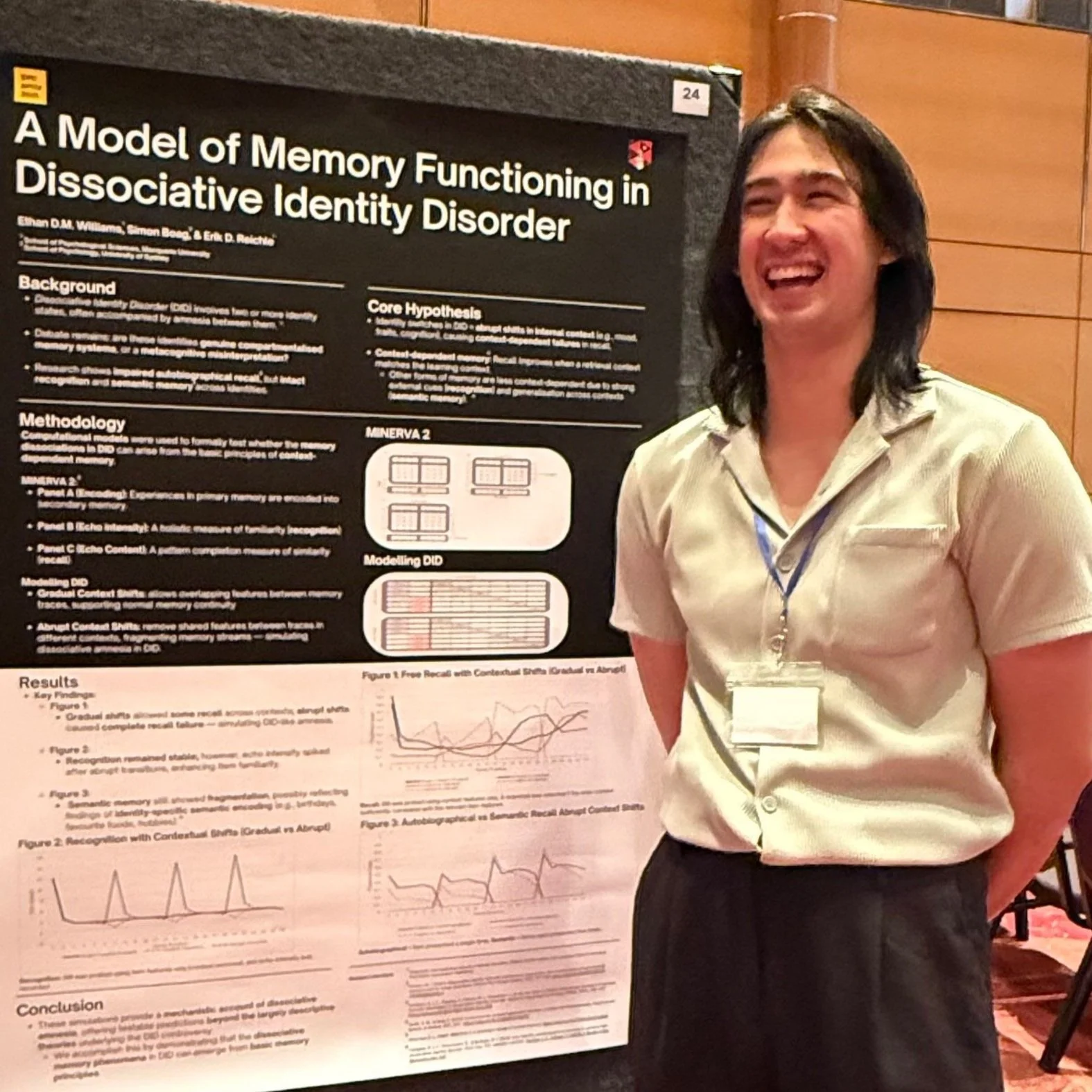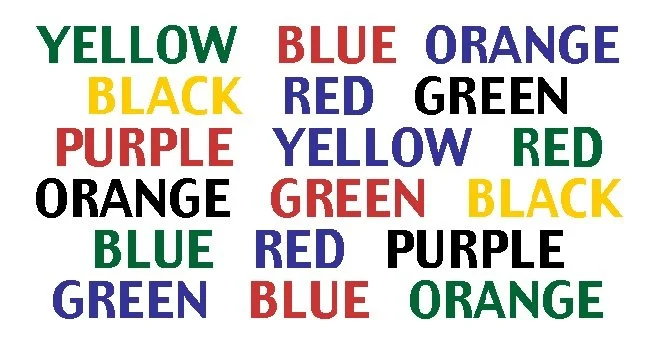
Scheduled Talks
2025 Upcoming Talks
2025 Upcoming Talks
All the talks will be available in hybrid formats: If you'd like to join us, please contact us (click the button to the left) for the Zoom link.

Upcoming Talks and Discussions
-

Dr. Anastasia Stoops
Wednesday 10:00, 10 Dec 2025
Morphosemantic/morphosyntactic parafoveal processing in skilled readers: evidence from English
-

Adam Bull + Ethan Williams
Wednesday 14:00, 5 Nov, 2025
PhD projects discussion:
Adam: Why Does Memory Fail in Span Tasks?
Ethan: The Semanticisation of Memory
-

Dr. Catherine Mason
Wednesday 14:00, 15th October, 2025
Understanding Emotion Word Processing in Aphasia and Language Unimpaired Speakers: A Multiple Methods Approach
-

Ethan Williams
Wednesday 15:00, 24 September 2025
Conference Practice Talk: A Context-Dependency Model of Memory Functioning in Dissociative Identity Disorder
-

Dr. Iain Giblin
Wednesday 14:00, 24 September, 2025
So what you're really saying is...
-

Jin Tian
Wednesday 14:00, 10 September, 2025
PhD Project Discussion: Anticipating meaning: spatiotemporal dynamics of predictive processing during natural sentence reading
-

Shuyuan Chen
Wednesday 14:00, 27 August, 2025
PhD Project Discussion: Using Computer Models and Eye Movements to Interpret MEG Data During Chinese Reading
-

Dr. Lili Yu
Wednesday 12:45, 13 August, 2025
Natural Word Segmentation Cue in Chinese Sentence Reading
-

A/Prof. Heather Sheridan
University at Albany, SUNY
Wednesday 10:30, 23 July, 2025
Individual differences in reading fluency in Schizophrenia: Evidence from eye movements and fixation-related potentials
-

Dr. Robert M. Ross
Wednesday 14:00, 9 July, 2025
Conspiracy Theories, Misinformation, and Sincerity of Belief Reports
-

Alessia Rossetto
Wednesday 4:00 pm, 25 June 2025
The role of semantic interpretability and syntactic legality in complex nonword recognition.
-

EPC Practice Talks
Wednesday 2:00 pm, 11 June 2025
Jin Tian: Examining the Effects of Character and Word Predictability in Chinese Reading
Sachiko Kinoshita: Masked transposed morpheme priming effects are solely orthography-driven in Chinese and English
-

Sam Curtis
Wednesday 14:00, 30 April, 2025
What drives the distractor-priming benefit in the color-word Stroop task?
-

Catherine Mason
Wednesday 14:00, 02 April, 2025
What can emotion and abstract words tell us about subjective semantic ratings?
-

Shuyuan Chen
Wednesday 14:00, 19 Mar 2025
Direct lexical control of eye movements in Chinese reading: Evidence from the co-registration of EEG and eye tracking
-

Esra Ataman
Wednesday 14:00, 19 Mar, 2025
Oral vocabulary and learning to read morphologically complex words: An eye-tracking study
-

Prof. Erik Reichle
Wednesday 14:00, 5 Mar, 2025
Using MEG and Eye-Tracking to Examine the Eye-Mind Link During Reading
2024 TALKS AND DISCUSSIONS
17 October 2024 13:00-15:00Prof. Davide Crepaldi Talk
University of Pavia in Italy
Are words anything special? Statistical learning, efficient information take-up and written words
-
Multiple sources of evidence support the idea that reading and visual word identification build upon statistical regularities in the (written) language. However, statistical learning is surely not a language-specific engine, and seems to be deeply embedded into the visual system. This begs the question: How special is letter and word processing, really? In this talk, I'll show that one fundamental mechanism underlying word representation and processing -- widely thought to be reading-specific -- applies in fact to many other types of visual objects. I'll also show that the distribution of information across wordforms guides eye movements, in a way that is simply explained by a fundamental, non-language-specific computational principle -- efficient information take-up. These findings nicely integrate with other recent work in the lab with developing readers, adults exposed to artificial lexicons and rats trying to make sense of letter strings. Overall, we find clear traces of sensitivity to statistical structure in both linguistic and non-linguistic materials, and linguistic and non-linguistic animals -- with striking similarities. Of course, this body of evidence doesn't necessarily mean that the whole lexical-semantic system can be explained by statistical learning. However, it does suggest that the ramifications of perception within language are more widespread than we would typically think, and perhaps we can explain very much of our linguistic behaviour without assuming language-specific computations.
15 August 2024 13:00-14:00Dr. Roslyn Wong Practice Talk
Macquarie University
Predictability effects in Chinese reading: Evidence from eye movements during corpus reading
-
It is well-established that the predictability of a word influences the probability and duration of eye fixations on words when reading alphabetic scripts like English. However, less research has investigated these effects in non-alphabetic scripts like Chinese, where text is written as strings of characters with no spacing cues to demarcate word boundaries. The present research reanalysed the eye-movement data of 60 participants who read a corpus of Chinese sentences for which the probability of each character and word were estimated by separate samples of participants. Linear mixed-effects models assessed the relative contributions of character- and word-based probabilities, as well as the impact of partial syntactic and semantic information, on readers’ eye movements across the time course of lexical and post-lexical processing. The results will provide insights into the functional units that influence predictability effects in Chinese reading. The implications for theories of prediction in language comprehension and models of eye-movement control across different writing systems will be discussed.
9 May 2024 13:00-14:00Yan Feng PhD Work Presentation
Macquarie University
English and Chinese compound words (and their morphemes) processing
28 March 2024 11:00–12:30Samantha Curtis PhD Work Talk
Macquarie University
RT Distribution of the Distractor Primed Stroop
19 September 2024 13:00-14:30
MRes Students Symposia Practice
Macquarie University
Andrew Tran: A syntactically controlled sentence corpus for the evaluation of computational reading models,
Adam Bull: Developing a global workspace model of episodic memory,
Jin Tian: Examining the effects of Character and Word Predictability in Chinese reading and
Ethan Williams: Memory, Identity, and Dissociation: A MINERVA Model Exploration of DID.
13 June 2024 13:00-14:30
Esra Ataman Practice Talk
Macquarie University
The Head-Preference Effect and Novel Compound Acquisition
-
The head-preference effect in compound word processing suggests that readers tend to recognise head constituents more easily than modifier constituents (Gagné et al., 2009; Libben et al., 2003; Marelli et al., 2009). However, it is less clear if this effect generalizes to novel compounds, which we assessed in the present novel word training study. Hundred-sixty-five native speakers of English (78 in Experiment 1 and 87 in Experiment 2) participated in a training session in which they were exposed to the spoken form (Experiment 1) or spoken and written form (Experiment 2) and the meaning of the novel compound constituents. Their learning performance was tested using two learning check tasks (e.g., picture naming and semantic categorization for the constituents). In the post-training session, participants completed a semantic categorization task, including novel compound targets with two trained constituents (trained + trained) and novel compound targets with one trained and one untrained constituent (trained + untrained; untrained + trained). Participants had to decide whether the novel compound was living or non-living. In Experiment 1, where participants were trained on the spoken form of the novel constituents only, the head-preference effect on post-training was absent. In Experiment 2 however, where the training opportunity was increased by exposing participants to the spoken and written form of the novel constituents, a difference between head and modifier responses in post-training was found. In the trained + trained condition, participants responded more slowly to heads (2543 ms) than modifiers (2212 ms), pointing to a larger semantic interference effect for head compared to modifier constituents. In the trained + untrained and untrained + trained conditions, there was no significant RT difference between the conditions where the head was trained and the conditions where the modifier was trained, suggesting that the head-preference effect did not generalise to the untrained context. However, individual differences in learning outcomes revealed that participants who reached better outcomes in the training task found it easier to classify novel compound words including trained constituents in the post-training task, suggesting that better learners were more expert at identifying embedded constituents. The current findings point to differences in the role of head and modifier constituent in the acquisition of compound words.
11 April 2024 13:00-14:00
Haiting Lan PhD Proposal Discussion
Macquarie University
An Investigation of Reading in Multimodal Interactive Contexts: Evidence from Instructional Subtitles in Cooperative Video Games
-
Interactive multimodal media (e.g., video games and interactive VR) is gaining popularity in education, training, therapy, and entertainment. While these media heavily rely on images and sound, reading remains ubiquitous to support information processing. Moreover, the role of reading within interactive multimodal media is becoming more flexible: either the primary task that drives comprehension or as a supplementary tool that supports immediate performance.
In my study, sixty participants will be recruited to participate in a video game composed of three distinct sections, each situated in a different reading context: monomodal, multimodal non-interactive, and multimodal interactive. In both the multimodal non-interactive and interactive contexts, participants will experience three phrases. These phrases will feature instructional subtitles presented in three modalities: visual, auditory, and a combination of visual and auditory (“visual-auditory”). Eye movements will be tracked across all sessions in the three contexts. Performance in the multimodal interactive context will be measured via gaming scores.
This study proposes that gaining insights from reading in interactive multimodal contexts can inform us on how to utilise texts’ functions across media to enhance people’s performance.
14 March 2024 13:00-14:30
Silvana Fluetsch Keravec Practice Talk
Macquarie University
Dictating instead of handwriting: Potential and challenges for 5th grade students with dyslexia
-
Writing is a key competence for academic and professional career. However, how should students with dyslexia acquire this competence when spelling is such a barrier? A quasi-experimental trial with mixed methods design explores if dictating could be a solution for these students. The goal of correct spelling lays in producing understandable and readable texts. On the other hand, the goal of writing in terms of text production is to communicate, to proof knowledge, or to structure thoughts. In this rationale, a text can be composed orally, while using a dictation tool. This might, according to the cognitive load theory, free resources in the working memory, which can be used for higher level order processes, such as planning or structuring a text.
The use of a dictation tool, also known as speech to text (STT), must be learnt, which is particularly challenging for learners with dyslexia. However, in addition to the thorough introduction of a tool, effective writing instruction is also required to make the application of this digital tool being promising. The study at the centre of this paper has explored the application of STT in the writing classroom, with an additional focus on teaching text composition and writing strategies. Research results show the opportunities and challenges that students with dyslexia encounter when they dictate their texts instead of writing them in a traditional way. It suggests that some features in the students and in the learning environment, boost the use of STT, while others rather inhibit it.
The paper will first outline the theoretical background pertaining to STT for learners with dyslexia. It will then focus on the chosen research method and present the results of the study. The final part of the paper will reflect on how to introduce, accompany, and use STT tools in schools.
5 September 2024 13:00-14:30Xin Yi Yap PhD Proposal Discussion
Macquarie University
Understanding the mechanisms and effects of auditory perceptual simulation
-
During this discussion, Xin Yi will present her PhD proposal on “understanding the mechanisms and effects of auditory perceptual simulation.” If you could be there to give Xin Yi some feedback at this early stage, it would be very much appreciated!
23 May 2024 13:00-14:30Alexander Kilby Honours Project Presentation
Macquarie University
Investigating the Time Course of Emoji-Text Semantic Integration Using Eye Tracking
-
For my honours project last year, I ran an eye-tracking experiment investigating the time course in which emojis are integrated with its surrounding textual context. We were hoping to decrease what were a high proportion of emoji skipping rates found in a previous experiment by engaging readers in more careful reading strategy. While these task demands placed on readers did result in a different pattern of results to the previous experiment, these results were incredibly sensitive to how we ran the analysis. I hope that these findings are helpful in demonstrating that researchers should carefully consider power, task demands, models structures, data cleaning, and assumption testing when undertaking similar kinds of experiments.
5 April 2024 13:00-15:00
MRes Students Commencement Plans
Macquarie University
Andrew Tran: A syntactically controlled sentence corpus for the evaluation of computational reading models,
Adam Bull: Developing a global workspace model of episodic memory,
Jin Tian: Examining the effects of Character and Word Predictability in Chinese reading and
Ethan Williams: Memory, Identity, and Dissociation: A MINERVA Model Exploration of DID.
29 February 2024 13:00-14:30A/Prof. Sachiko Kinoshita Talk
Macquarie University
"Carpet” or “honeymoon”? – Sachiko and Lili’s excellent adventure or Transposed-constituent priming in English and Chinese
2023 TALKS AND DISCUSSIONS
30 November 2023 at 1:00 pm – 2:30 pm
A/Prof. Sachiko Kinoshita Keynote Talk Practice
Macquarie University
18th International Conference on Processing East Asian Languages
26 October 2023 at 1:00 pm - 2:30 pmDr. Brian Ballsun-Stanton Talk
Macquarie University
Theoretical and practical wonders of large language models and how we can use these tools more knowledgeably and efficiently
-
See a previous workshop on this topic (workshop slides see: https://osf.io/c39rs)
23 November 2023 at 1:00 pm - 3:00 pm
Emeritus Prof. Marcus Taft Talk
University of New South Wales
12 October 2023 at 1:00 pm – 2:30 pm
A/Prof. Sachiko Kinoshita Talk
Macquarie University
Transposed-constituent priming with English compound word targets
-
As the title. Chinese-equivalent comparisons will also be discussed.
9 November 2023 at 1:00 pm - 2:30 pm
Dr. Aaron Veldre Practice Talk
Macquarie University
The influence of sentence context on letter position coding during reading
TBC
3 August 2023 at 2:00 pm – 4:00 pm
A/Prof Maximiliano A. Wilson Talk
Laval University, Canada
Lexical database for ~70k English words with morphological variables
31 August 2023 at 10:00 am – 11:00 am
A/Prof. Selçuk Güven Talk
Montreal University, Canada
Complex word reading deficits in children with dyslexia
24 August 2023 at 1:00 pm – 2:30 pm
Xin Yi Yap MRes Project Talk
Macquarie University
Reading Between the Lines: Linguistic Properties as Cues for Word Segmentation in Chinese Sentence Reading
-
A major feature that distinguishes Chinese writing from the alphabetic system is that words are not separated by spaces in Chinese sentences. It thus remains a puzzle how Chinese readers segment and identify words in sentences in order to read efficiently. The present study investigated whether and how Chinese readers use the morphological structure of words as a cue to guide their word segmentation and identification process. Two-character target words varying in morphological complexity (monomorphemic versus compound words) were embedded in sentences, and colour (Experiment 1) and word space (Experiment 2) manipulations were introduced to create a congruent or incongruent segmentation of the target words. Experiment 1 showed a slowdown to monomorphemic words when segmentation was incongruent, relative to the non-coloured control condition, providing some support for utilising morphological cues for word segmentation; however, the results of Experiment 2 were less clear.
1 August 2023 at 1:00 pm – 3:00 pm
Prof Kate Nation Talk
Oxford University, UK
Developmental trajectory of derivational morphemic knowledge in children
27 July 2023 at 1:00 pm - 2:30 pm
Dr. Roslyn Wong PhD Work Talk
Macquarie University
Anticipatory prediction during online language processing
13 July 2023 at 1:00 pm - 5:00 pm
SSSR Practice Talks
Macquarie University & Australian Catholic University
Society for the Scientific Study of Reading Practice Talks
6 July 2023 at 8:00 am - 9:00 am
Dr. Mirrah Maziyah Mohamed & Dr. Hasibe Kahraman
University of Western Ontario, Canada & Macquarie University
Cross-language morphological processing
29 June 2023 at 1:00 pm – 3:00 pm
A/Prof. Sachiko Kinoshita Talk
Macquarie University
What diacritic priming can tell us about letter identification
25 May 2023 at 1:00 pm - 2:30 pm
Dr. Aaron Veldre
Macquarie University
Letter Identity and Position Coding in the Parafovea
